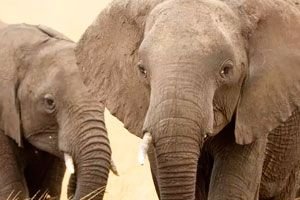
All iLive content is medically reviewed or fact checked to ensure as much factual accuracy as possible.
We have strict sourcing guidelines and only link to reputable media sites, academic research institutions and, whenever possible, medically peer reviewed studies. Note that the numbers in parentheses ([1], [2], etc.) are clickable links to these studies.
If you feel that any of our content is inaccurate, out-of-date, or otherwise questionable, please select it and press Ctrl + Enter.
Elephants spend 22 hours a night without sleep
Last reviewed: 02.07.2025
 ">
">American scientists together with colleagues from South Africa have determined that the African elephant spends almost no time sleeping. Biologists conducted long-term observation of two wild female elephants and discovered that they slept only two hours a day. Among mammals, this is an absolute record.
Scientists have been interested in the details of the physiology of such large and unique animals as elephants for many years. The first experiments related to the sleep period of elephants were conducted back in the thirties of the twentieth century. Then experts found that the largest mammals on the planet prefer to sleep at night, on average 4-6 hours a day. But the results of these studies turned out to be erroneous, because scientists studied the characteristics of elephants living in captivity. Biologists have long known the fact that almost any animal, being in captivity, with food and drink, sleeps longer than in natural habitats.
Modern scientists have taken a more detailed approach to the study: they observed wild female elephants living in Botswana. The elephants were fitted with GPS and gyroscopic devices, and actigraphs were attached to their trunks – devices that record the frequency of motor activity over a certain period of time.
Scientists were unable to simply estimate the duration of sleep by analyzing the animals' brain activity. The fact is that elephants have a very dense cranium, and implanting electrodes into it was not easy.
Based on the results of previous experiments, scientists knew that the motor activity of the trunk always accurately indicates whether the animal is awake or asleep. Therefore, they considered that the elephant is asleep if its trunk is motionless for 5 minutes or more. Long-term observations allowed them to determine that the average duration of sleep in female elephants was 2 hours. At the same time, their sleep was intermittent - 20-60 minutes with short breaks.
In extreme conditions, when animals had to cover long distances, escaping from pursuit or in search of food, they could go without sleep for up to 2 days in a row. At the same time, their subsequent sleep was no different from what it was before the journey.
In addition, experts also determined the elephant's sleeping position. It was found that 70% of the time, the elephant prefers to sleep standing up, and only sometimes lies down.
Zoologist John Lescu, from Australia's La Trobe University, said it was important to determine the optimal posture of an animal during different sleep phases. "For example, many ungulates sleep standing up, with their eyes slightly open, and even chew their food. So it's likely that elephants sleep for long periods, too, but their appearance and movements don't give that impression."
However, the reported duration of nighttime rest in elephants has been recorded and remains the shortest of any mammal group. Other known large mammals spend much longer periods of time sleeping.
 [ 1 ]
[ 1 ]
